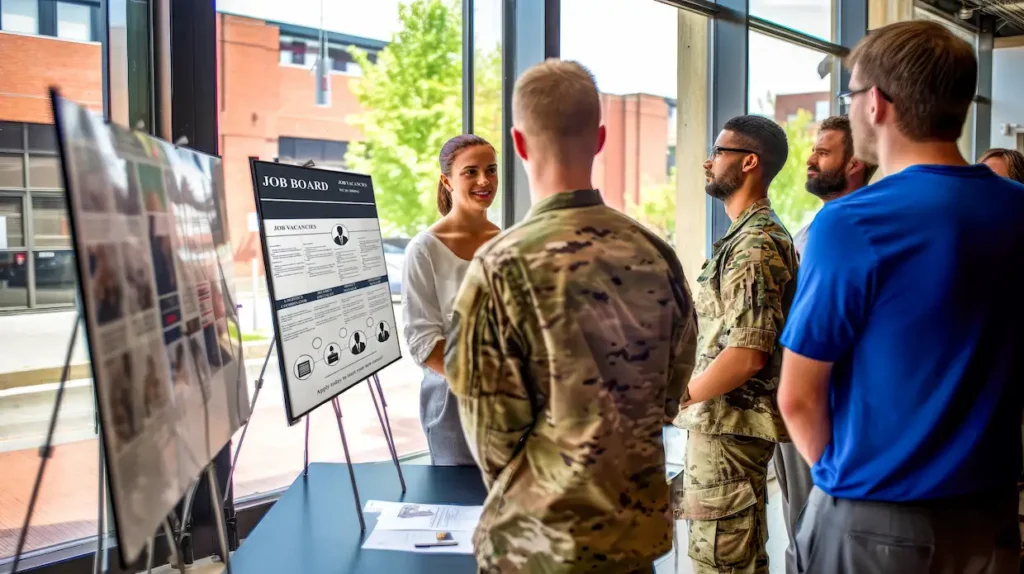Introduction to Veteran Employment Opportunities
Transitioning from military service to civilian employment represents one of the most significant challenges veterans face. Despite possessing valuable skills, leadership experience, and disciplined work ethics developed during their service, many veterans struggle to navigate the civilian job market effectively. As of 2025, approximately 200,000 service members transition to civilian life annually, making veteran employment a critical national priority. This comprehensive guide explores the diverse career paths available to veterans, industries that value military experience, and the extensive resources designed to support a successful transition.
Military Skills That Transfer to Civilian Careers
Leadership and Management Experience
Military service inherently develops leadership capabilities that civilian employers highly value. Veterans with leadership roles have demonstrated their ability to motivate teams, make critical decisions under pressure, and manage complex operations—skills that translate seamlessly to management positions across industries. Former military officers and non-commissioned officers often excel in roles requiring team management, project coordination, and strategic planning.
Technical and Specialized Training
Many service members receive advanced technical training during their military careers that directly correlates to civilian certifications and qualifications. Veterans with backgrounds in:
- Information technology and cybersecurity
- Aviation maintenance and operations
- Logistics and supply chain management
- Healthcare services
- Engineering and infrastructure
Often possess specialized knowledge that can be immediately valuable in related civilian sectors. For example, military communications specialists can transition to telecommunications or IT network administration, while military medics have foundational training applicable to various healthcare positions.
Security Clearances
Veterans who held security clearances during their service have a significant advantage when applying for jobs requiring similar clearances. This advantage is particularly valuable in:
- Defense contracting
- Federal government positions
- Critical infrastructure protection
- Intelligence community roles
These clearances, which can be expensive and time-consuming for employers to obtain for new hires, make veterans with active clearances especially competitive candidates.
Top Industries for Veteran Employment
Government and Public Service
The federal government remains one of the largest employers of veterans, with special hiring authorities designed to facilitate veteran employment. Federal agencies provide veterans’ preference in hiring processes and often have dedicated veteran recruitment programs. State and local governments similarly value military experience and offer career paths in:
- Law enforcement and public safety
- Administration and policy implementation
- Emergency management
- Public works and infrastructure
Defense Contracting
The defense industry naturally values military experience and offers positions that allow veterans to leverage their specialized knowledge. Major defense contractors actively recruit veterans for roles in:
- Systems analysis and engineering
- Program management
- Intelligence analysis
- Logistics coordination
- Technical consulting
These positions often allow veterans to continue supporting national security objectives while transitioning to civilian employment.
Healthcare
The healthcare sector provides numerous opportunities for veterans with medical training as well as those without prior healthcare experience. Veterans with military medical experience can pursue careers as:
- Nurses and medical technicians
- Emergency medical technicians
- Healthcare administrators
- Medical equipment technicians
Even veterans without medical backgrounds find opportunities in healthcare security, logistics, and administration, leveraging their leadership and organizational skills.
Information Technology and Cybersecurity
The growing importance of digital infrastructure security has created substantial demand for professionals with cybersecurity expertise. Veterans from intelligence, communications, or IT military occupational specialties are well-positioned for careers in:
- Network security
- System administration
- Cybersecurity analysis
- Information assurance
- Cloud computing
Companies like Amazon, Microsoft, and Google have specialized veteran recruitment initiatives specifically targeting military talent for their technical divisions.
Law Enforcement and Security
Military experience provides excellent preparation for careers in law enforcement and security management. Veterans often transition successfully to roles in:
- Federal agencies (FBI, DEA, Border Patrol)
- State and local police departments
- Corporate security management
- Private security contracting
- Emergency response coordination
Many of these agencies offer accelerated training or adjusted qualification requirements for veteran applicants.
Transportation and Logistics
Veterans with experience in military logistics, transportation, or supply chain management find numerous opportunities in this sector. Potential career paths include:
- Commercial aviation (pilots and maintenance)
- Transportation management
- Supply chain coordination
- Fleet operations
- Warehouse and distribution management
Companies like FedEx, UPS, and major airlines have established veteran hiring initiatives that specifically target military logistics experience.
Entrepreneurship: Veterans as Business Owners
Military service fosters many attributes essential for successful entrepreneurship, including risk management, resilience, and strategic planning capabilities. Veterans start businesses at higher rates than non-veterans, with approximately 9% of all U.S. businesses being veteran-owned. Resources specifically supporting veteran entrepreneurs include:
- The Small Business Administration’s Boots to Business program
- Veteran Business Outreach Centers
- Entrepreneurship training through Bunker Labs
- Veteran-focused investment networks and funding opportunities
These resources provide specialized training, mentorship, and in some cases, access to capital for veteran business ventures.
Key Resources for Veteran Job Seekers
Government Programs and Benefits
Veterans have access to several government programs specifically designed to support their transition to civilian employment:
Transition Assistance Program (TAP)
This Department of Defense program provides comprehensive transition support including career workshops, resume building, and interview preparation for service members preparing to separate from the military. TAP workshops cover:
- Skills assessment and career planning
- Employment documentation preparation
- Job search strategies
- Benefits navigation
GI Bill Education Benefits
The Post-9/11 GI Bill offers extensive education benefits that can fund:
- College degrees
- Vocational training
- Certification programs
- On-the-job training and apprenticeships
These benefits enable veterans to acquire new skills or credentials that enhance their employability in their chosen fields.
Veteran Readiness and Employment (VR&E)
Formerly known as Vocational Rehabilitation and Employment, this program provides specialized support for veterans with service-connected disabilities, including:
- Vocational assessment and planning
- Education and training expenses
- Job search assistance
- Self-employment support
DOL Veterans’ Employment and Training Service (VETS)
This Department of Labor program offers employment resources including:
- Job search assistance through American Job Centers
- Protection of veterans’ employment rights
- Transition assistance for separating service members
- Resources for employers hiring veterans
Private Sector and Nonprofit Resources
Numerous organizations beyond government agencies provide valuable assistance to veteran job seekers:
Hiring Our Heroes
This U.S. Chamber of Commerce Foundation program connects veterans and military spouses with meaningful employment opportunities through:
- Career fairs and hiring events
- Fellowship programs with leading employers
- Training and networking opportunities
- Digital job search tools and resources
Wounded Warrior Project
Beyond supporting veterans’ recovery and wellness, the Wounded Warrior Project offers career counseling and employment assistance through their Warriors to Work program.
Military-Specific Job Boards
Specialized job boards focus exclusively on opportunities for veterans:
- Hire Heroes USA
- Military.com’s Veteran Jobs
- RecruitMilitary
- Veteran Recruiting
These platforms feature employers specifically seeking veteran talent and often allow for military skills translation in search parameters.
Corporate Veteran Recruiting Initiatives
Many major corporations have established dedicated veteran hiring programs, including:
- Amazon’s Military Recruitment program
- Microsoft Software & Systems Academy
- Boeing’s Military Skills Translator
- Walmart’s Find-a-Future platform
- JPMorgan Chase’s Military Pathways program
These initiatives typically include specialized recruitment, training, and mentorship components designed for transitioning service members.
Strategies for Successful Transition to Civilian Employment
Translate Military Experience Effectively
One of the greatest challenges veterans face is effectively communicating their military experience in civilian terminology. Successful strategies include:
- Using civilian-friendly language rather than military acronyms and jargon
- Focusing on transferable skills rather than specific military roles
- Quantifying achievements and impact where possible
- Highlighting soft skills like leadership, adaptability, and problem-solving
Many transition resources provide military-to-civilian skills translators to assist with this process.
Build a Professional Network
Networking proves particularly valuable for transitioning veterans who may lack established civilian professional connections:
- Join veteran professional organizations in your field of interest
- Attend industry events and career fairs
- Connect with veteran employee resource groups at target companies
- Utilize LinkedIn and other professional networking platforms
- Participate in veteran mentorship programs
These connections often provide invaluable insights about company culture and unadvertised opportunities.
Consider Additional Education or Certification
While military experience provides tremendous value, additional credentials often enhance a veteran’s competitiveness in specific fields:
- Identify certifications relevant to your target industry
- Explore accelerated programs that offer credit for military training
- Consider bridge programs designed specifically for veterans
- Utilize GI Bill benefits strategically to maximize educational opportunities
Many industries offer veteran-specific pathways to certification that account for military training and experience.
Prepare for Cultural Differences
The transition from military to civilian workplace culture represents a significant adjustment. Preparation should include:
- Understanding differences in communication styles
- Adapting to less structured environments
- Recognizing varying leadership approaches
- Developing comfort with self-promotion during interviews
- Building awareness of industry-specific norms and expectations
Many veteran mentorship programs specifically address these cultural transition challenges.
Conclusion: Pathways to Success in Civilian Employment
The transition from military service to civilian employment presents both challenges and opportunities. Veterans bring exceptional qualities to the workforce—discipline, leadership experience, adaptability, and specialized training—that provide value across virtually every industry. By leveraging the extensive resources available specifically for veteran job seekers and applying strategic approaches to their job search, veterans can successfully navigate this transition.
Employers increasingly recognize the unique value that veterans bring to their organizations, implementing specialized recruitment initiatives and support programs to attract and retain military talent. For veterans beginning their civilian career journey, the combination of their military experience, targeted resources, and strategic preparation creates a pathway to meaningful and rewarding employment opportunities.
Whether pursuing a career that directly utilizes military skills, acquiring new credentials for an entirely different field, or launching an entrepreneurial venture, today’s transitioning veterans have more support and opportunities than ever before. With proper preparation and resource utilization, veterans can successfully translate their military service into thriving civilian careers.

